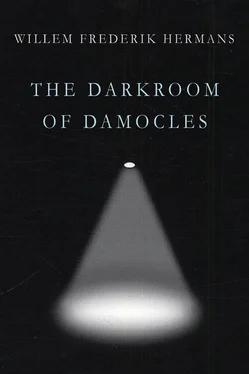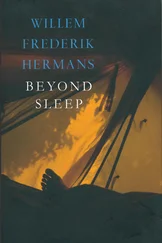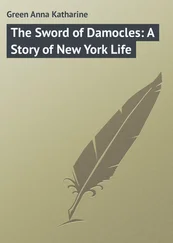‘Is this Dorbeck?’ Selderhorst asked.
Osewoudt hesitated.
The dentist sank to his haunches, inserted his spatula between the closed jaws and prised them apart. In his other hand he held his torch.
‘I’ve seen enough!’ he said, straightening up. ‘Not a tooth left in his mouth!’
It was mid-November, and many weeks since Osewoudt had last been called for questioning. One morning when Spuybroek came to inspect his cell, he raised the subject.
‘Couldn’t you ask Selderhorst to give me another hearing?’
‘What for? What would be in it for you? Don’t you think they’ve got enough files on you already?’
‘But there are still so many details that haven’t been discussed!’
‘You’re mad. It’s sheer madness on your part to think that more discussions will help. Incriminating evidence is, oddly enough, rather like cork. Sink a ship with a cargo of cork and the cork will come up again, whatever you do.’
‘Still, I’d really like to speak to Selderhorst. Ask him when I can see him.’
At half past eleven that evening he was taken from his cell and conducted to Selderhorst’s office.
Selderhorst’s desk was stacked so high with files that he could barely see over the top, which was probably why he leaped to his feet when Osewoudt came in through the door.
‘You again! What do you want? I didn’t send for you.’
‘That’s exactly why I’m here!’
‘I have no intention of losing any sleep over you. Did you think I still don’t know enough about you to have you sentenced to death three times over?’
‘No, in actual fact you know nothing about me! You never brought up any of the facts that speak in my favour. The country’s been liberated, and yet here I am, behind bars with a bunch of traitors, spies and black marketeers. Don’t I have a right to be free? Did I not do my bit for the liberation? Did I not liquidate the monster Lagendaal?’
Selderhorst stamped his feet with rage.
‘Damn you! How dare you talk to me like that?’
He waved at the files.
‘There isn’t a minute of your existence during the German occupation that is not documented in these files. For every time you scratched your arse I can produce ten sworn statements! What’s the matter with you? Why did you come here? To tell me yet again that it was you who liquidated Lagendaal? Take a look in the mirror, you creep. Look in the mirror and then tell me you’re the kind of man who would have had the guts to liquidate Lagendaal.’
He picked up the phone and shouted: ‘Bring me a mirror! Now! This minute!’
He slammed down the phone, took his chair from behind the desk and set it down back to front before Osewoudt. He sat astride the chair, resting his arms on the back. He was still wearing the same shabby grey suit, his eyes were red from lack of sleep, his cheeks were covered with grey and black stubble, but on his feet he wore a new pair of army boots, brown and lavishly studded with nails.
‘There is no proof whatsoever that you killed Lagendaal! All the records pertaining to his murder come from German sources. How can we trust them? Those same Germans who had you abducted from the hospital by their own people so you would lead them to the Resistance — how reliable can their version of who killed Lagendaal be? It’s far more likely they did it themselves; maybe he was asking for too much money. Maybe it was the girl who did it, Annelies van Doormaal, the poor girl the Germans arrested with one of your photos on her! What the Germans have to say about Lagendaal’s murder is of not the slightest interest to us.’
‘What about Lagendaal’s young son?’
‘The Lagendaal boy said you took him to Amsterdam by train, along with Annelies van Doormaal. She was arrested on the way, and you abandoned the boy on some pavement, on Rokin it was, I believe. And besides, even if it’s true that you killed Lagendaal, how is that going to back up your Dorbeck story?’
‘Lots of people knew Dorbeck. They can’t all be dead, and even if they are, they must have mentioned him to other people before they died.’
‘Who would those people be?’
‘For instance the people I did the job in Haarlem with, at Kleine Houtstraat 32.’
‘Aha! Aha! At last!’
Selderhorst jumped up from his chair; the chair teetered.
‘At last Mr Osewoudt here has decided to be more forthcoming! Kleine Houtstraat, number 32! Let’s hear what he has to say for himself.’
‘It was one of the first jobs I did for Dorbeck. He’d called at the shop a few days earlier. I asked the policeman who was there when we dug up the uniform, remember, and he said he’d seen him.’
‘He saw that the light was on in the shop, that’s all.’
‘He saw someone leaving the shop. Dorbeck had been to see me; he’d given me a pistol. A while before that, he’d sent me a couple of Leica films to develop. Which I did, but there was nothing on them.’
‘Really? Nothing? Are you sure? How could you tell in your darkroom?
‘I didn’t have a darkroom.’
‘You didn’t have a darkroom? Go on, tell me more.’
‘There was nothing on those Leica films. Dorbeck came to see me and told me the films had been planted on him and his friends by the Germans, by German provocateurs. He had decided to liquidate them. So he had made an appointment with them in Haarlem, at Kleine Houtstraat 32. He wanted me to help. So I did. There were three of us: Dorbeck, Zéwüster and me. Dorbeck stayed outside, on the lookout. Zéwüster and I went inside. We were received in a back room by three people. We shot them immediately.’
‘Exactly,’ said Selderhorst, taking out a file. ‘Do you know the names of the victims?’
‘No, we didn’t bother with introductions.’
Selderhorst opened the file and flicked through it.
‘Well, as it happens, I do have their names. They were Olifiers, Stoffels and Knijtijzen. Ringing any bells?’
‘Why would those names mean anything to me?’
‘They don’t? Then I’ll explain. Olifiers was on the level, Stoffels and Knijtijzen were working for the Gestapo. Olifiers didn’t know that, through no fault of his own. Why was Olifiers shot too?’
‘How was I supposed to know Olifiers was on the level?’
‘I’ll tell you something else. Those films came from Olifiers originally. And there was something on them all right. Photos of secret German documents. But after they’d been developed, the films were blank. How did that happen? You know more about this. Did you or did you not develop those films?’
‘I developed them, it’s true.’
‘Did you develop them properly?’
‘I didn’t have a darkroom.’
‘Ah, you didn’t have a darkroom. So perhaps you made some mistake, causing the images to be lost. Did you mention that when you sent the negatives? Did you put a note in with them saying: there’s nothing on them, but that could be my fault?’
‘No.’
‘And when you heard that those people had to be liquidated because there was nothing on the films, you still didn’t say anything?’
‘No, I didn’t. I didn’t say anything, because Dorbeck had sent two men to tell me there was no need to develop the films since there was nothing on them.’
‘Dorbeck! Not Dorbeck again?’
‘Dorbeck knows exactly how it all went. Anyway, even if there had been anything on those films, it doesn’t change the fact that Stoffels and Knijtijzen got what they deserved. You said yourself they were working for the Gestapo.’
‘But Olifiers was straight, and Zéwüster has testified that it was you who shot Olifiers!’
‘Is Zéwüster still alive then?’
‘He was caught later on by the Germans; he was shot. But I have the statements he made to the Germans right here. Zéwüster said he didn’t trust you from the start. He even said he’d seen you again some time later, at the University Library in Amsterdam. He had the impression you were following him. Zéwüster was studying accountancy. He thought: what’s someone like him doing in a university library? He must be looking for me.’
Читать дальше












